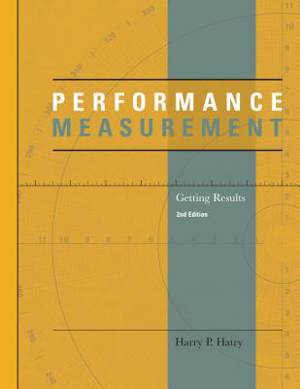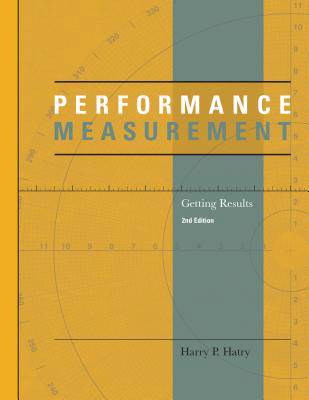
Door een staking bij bpost kan je online bestelling op dit moment iets langer onderweg zijn dan voorzien. Dringend iets nodig? Onze winkels ontvangen jou met open armen!
- Afhalen na 1 uur in een winkel met voorraad
- Gratis thuislevering in België vanaf € 30
- Ruim aanbod met 7 miljoen producten
Door een staking bij bpost kan je online bestelling op dit moment iets langer onderweg zijn dan voorzien. Dringend iets nodig? Onze winkels ontvangen jou met open armen!
- Afhalen na 1 uur in een winkel met voorraad
- Gratis thuislevering in België vanaf € 30
- Ruim aanbod met 7 miljoen producten
Zoeken
€ 89,95
+ 179 punten
Omschrijving
Long before reinventing government came into vogue, the Urban Institute pioneered methods for government and human services agencies to measure the performance of their programs. This comprehensive guidebook synthesizes more than two decades of Harry Hatry's groundbreaking work. It covers every component of the performance measurement process, from identifying the program's mission, objectives, customers, and trackable outcomes to finding the best indicators for each outcome, the sources of data, and how to collect them. Hatry explains how to select indicator breakouts and benchmarks for comparison to actual values, and describes numerous uses for performance information. Since the publication of the first edition in 1999, the use of performance measurement has exploded at all levels of U.S. government, in nonprofit agencies, and around the world. The new edition has been revised and expanded to address recent developments in the field, including the increased availability of computer technology in collecting and presenting information, the movement to use outcome data to improve services, and the quality control issues that have emerged as data collection has increased. It is an indispensable handbook for newcomers and an important resource for experienced managers looking to improve their use of outcome data.
Specificaties
Betrokkenen
- Auteur(s):
- Uitgeverij:
Inhoud
- Aantal bladzijden:
- 342
- Taal:
- Engels
- Reeks:
Eigenschappen
- Productcode (EAN):
- 9780877667346
- Verschijningsdatum:
- 16/01/2007
- Uitvoering:
- Paperback
- Formaat:
- Trade paperback (VS)
- Afmetingen:
- 216 mm x 279 mm
- Gewicht:
- 798 g

Alleen bij Standaard Boekhandel
+ 179 punten op je klantenkaart van Standaard Boekhandel
Beoordelingen
We publiceren alleen reviews die voldoen aan de voorwaarden voor reviews. Bekijk onze voorwaarden voor reviews.











